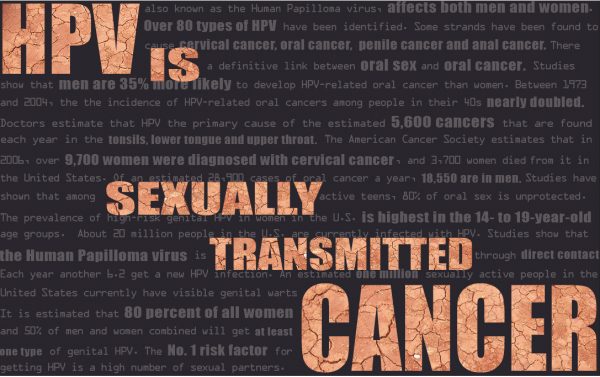Cancer prevention — Get the HPV vaccine!
February 5, 2018
 Get the HPV vaccine for free!
Get the HPV vaccine for free!Getting the HPV vaccine can prevent many cancers in addition to genital warts. If you haven’t had the HPV (human papilloma virus) vaccine series yet, you can get it for free at the Student Health and Counseling Center if you fit certain age criteria. Our walk-in vaccine hours are 8:30 a.m.–noon and 2-3:30 p.m. weekdays, except for Wednesdays beginning at 9:30 a.m.
What is the HPV vaccine?
The HPV vaccine protects against cancers caused by human papillomavirus infection. HPV is a very common virus; nearly 80 million people — about one in four — are currently infected in the United States. About 14 million people, including teens, become infected with HPV each year.
Most people with HPV never develop symptoms or health problems. Nine out of 10 HPV infections go away by themselves within two years. But sometimes HPV infections will last longer and can cause certain cancers and other diseases like genital warts. HPV infection can cause:
- cancers of the cervix, vagina and vulva;
- cancers of the penis; and
- cancers of the anus and back of the throat, including the base of the tongue and tonsils.
Every year in the United States, HPV causes 30,700 cancers in men and women. HPV vaccination can prevent most of the cancers (about 28,000) from occurring.
Who should get the HPV vaccine?
If you did not start or finish the HPV vaccine series when you were younger, you should get it as soon as possible. The vaccine consists of a series of three shots given over six months.
- The HPV vaccine is recommended for young women through age 26, and young men through age 21.
- The HPV vaccine is also recommended for the following people if they did not get it
when they were younger:
- young men (through age 26) who have sex with men, including young men who identify as gay or bisexual or who intend to have sex with men through age 26;
- young adults (through age 26) who are transgender; and
- young adults (through age 26) with certain immunocompromising conditions, including HIV.
For more information, visit www.uaf.edu/chc/ or call 474-7043.


